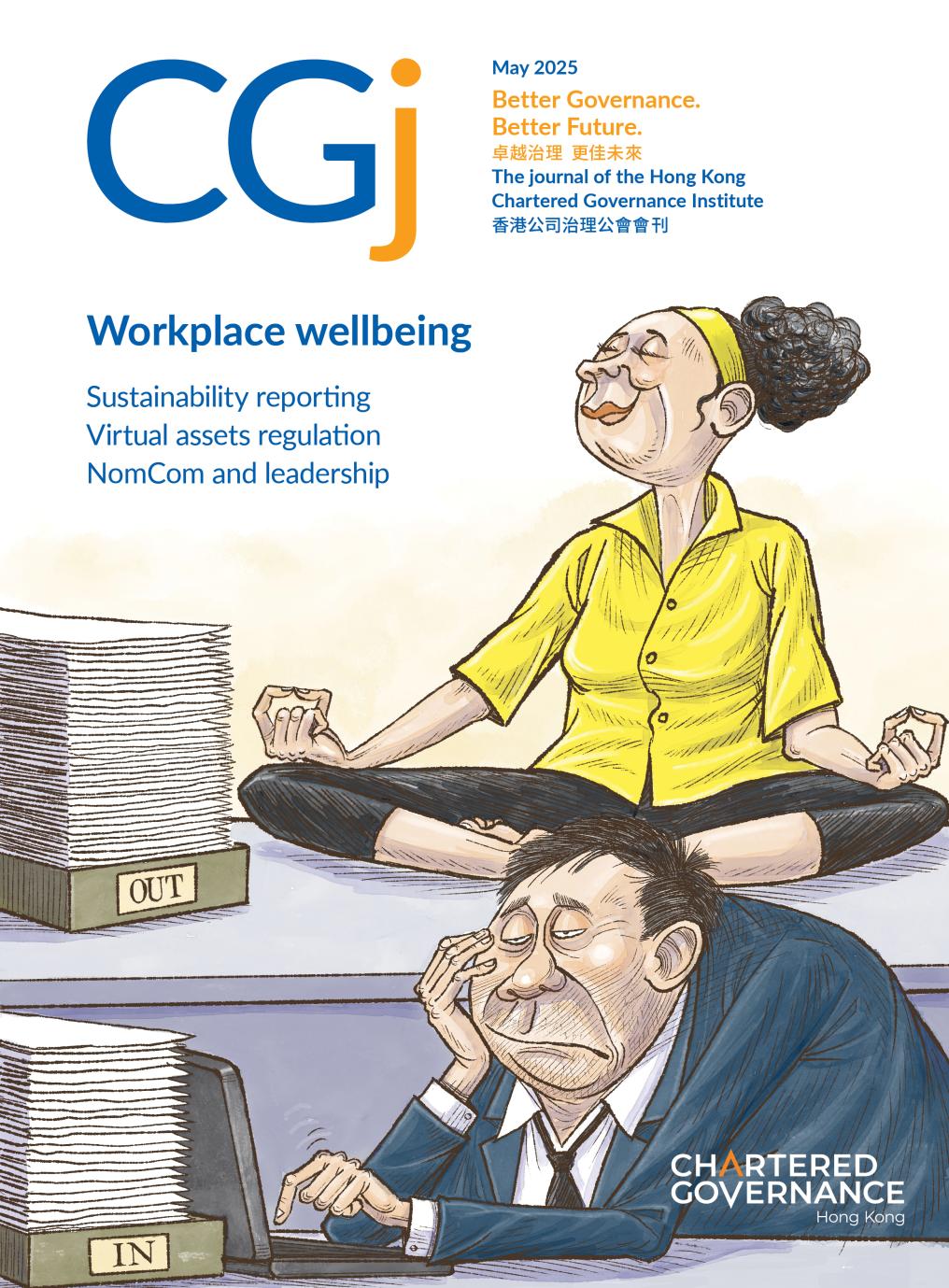
The case for nomination committee leadership
Loretto Leavy FCG, PhD candidate, University of Exeter Business School, and Ruth Sealy, Professor of Leadership, Henley Business School and Honorary Professor, University of Exeter Business School, explore how the nomination committee can help optimise board behavioural dynamics and assist in the navigation of the new governance requirements for Hong Kong boards.
Highlights
- Hong Kong’s updated Corporate Governance Code, effective from July 2025, requires boards to adopt performance reviews, skills matrix disclosures, tenure limits and mandatory training
- the Optimising Board Behavioural Dynamics handbook, to be launched on 1 July, offers a framework to help Hong Kong boards tailor their governance processes to their specific needs and challenges
- the key recommendation is that the nomination committee oversees all six core board processes, from appointing to reappointing, to ensure alignment and improve board effectiveness
Hong Kong’s corporate governance landscape is evolving with significant changes to the Corporate Governance Code and related Listing Rules taking effect in July 2025. These developments, including board performance reviews, skills matrix disclosures, limits on independent non-executive director (INED) tenure and multiple directorships, and mandatory director training will reshape boards. Some changes are regulatory requirements, while others represent good practice. How can Hong Kong boards and nomination committees navigate their response to these challenges?
Our new research on board behavioural dynamics provides a valuable lens through which to view these changes. This groundbreaking work exposes the processes used to bring the board together as a collective unit. Conducted by the University of Exeter Business School and Henley Business School, in collaboration with The Chartered Governance Institute UK & Ireland (CGIUKI), the research offers Hong Kong boards a blueprint to assist in the reset of their board people processes while implementing the 2025 governance changes via the leadership of the nomination committee.
The research is based on an analysis of disclosures of 50 FTSE boards, which identified six core people processes and their maturity maps. The maturity maps were validated through 14 workshops with governance professionals, regulators and professional bodies from large and highly regulated boards covering a number of jurisdictions. The full handbook underwent a two-month open consultation and will launch on 1 July at the 2025 CGIUKI Annual Conference held in London. This will serve as a useful resource in navigating Hong Kong’s new board landscape as it addresses a critical gap in governance and offers recommendations on how to enable boards to work together effectively – in other words, how to optimise board behavioural dynamics.
The handbook does not prescribe a ‘one-size-fits-all’ approach, but instead provides a framework for tailoring governance processes to each board’s unique situation. The handbook recommends introducing an essential governance architecture comprising six core processes that together enable effective board behavioural dynamics. Each of the 50 boards reviewed in our analysis were using the six core processes, albeit in varying ways. The six core processes are:
- appointing
- inducting, training and developing
- evaluating and acting
- non-executive director (NED) succession planning
- composing and designing, and
- reappointing.
“the handbook recommends introducing an essential governance architecture comprising six core processes that together enable effective board behavioural dynamics”
For each process, the handbook details three distinct maturity levels across three dimensions – the contextual pressures influencing the board, the procedural steps involved, and the outputs and outcomes achieved. Our consultation found comparable themes outside the UK board context.
The handbook’s comprehensive mapping allows boards to navigate approaches proportional to their specific circumstances, recognising that different boards will require different levels of process maturity depending on the complexity of their external environment, their organisational and strategic challenges, and their board-specific pressures and performance. Part of the specific circumstances involves the board’s legal and regulatory environment, including the challenge of navigating the new requirements and expectations.
Resetting the focus of Hong Kong’s nomination committees
In Hong Kong, the code recommends that a nomination committee is in place and this is common practice among boards. Focusing on how to enhance a nomination committee that is in place, we look to comparable findings in our research.
We found significant inconsistencies in how board processes were being overseen and are therefore recommending additional oversight of all six processes and their actions by the nomination committee. This recommendation that the nomination committee has oversight of all six processes is crucial to ensure effective delivery. However, we recognise that this must not challenge the chair’s responsibility for the six core processes, which must remain steadfast. An enhanced role for the nomination committee represents a significant expansion of its traditionally understood appointing-focused role, to one in which the committee becomes the guardian of the board’s overall effectiveness and the organisation’s leadership.
Our research focuses on the nonexecutive board people processes. The six processes identified in the handbook were found to be predominantly managed in isolation, rather than as a complementary system with shared aims. The handbook recommends that the six processes are deployed as a bundle using the maturity approach to customise the solutions to the board-specific position. By bringing these processes together under nomination committee oversight, boards can achieve greater strategic alignment, reduce duplication of effort and build a more comprehensive approach to enabling the board to work together.
“by bringing these processes together under nomination committee oversight, boards can achieve greater strategic alignment, reduce duplication of effort and build a more comprehensive approach to enabling the board to work together”
Let’s look at each process in turn in their Hong Kong listed context and their link to our recommendation for enhanced nomination committee oversight.
Appointing
Hong Kong currently requires nomination committees to have formal, rigorous and transparent procedures for board appointments. The Hong Kong Code Provisions recommend that the nomination committee, where established, is chaired by an independent director or the board chair and with a majority of independent members.
Hong Kong nomination committees’ oversight of appointing is aligned to the core process of all nomination committees. The nomination committee should be mindful that the appointing process interlinks with the other core processes, whether this is via inputs or outputs, implicitly or explicitly. Additional Hong Kong interlinking includes a new focus on skills matrices and the diversity of the nomination committee itself.
Our research sample and consultation found comparable themes within different jurisdictions, confirming that the nomination committee normally leads the process for the appointment of NEDs and CEOs, providing the board with a ‘nomination’ for the role. The research found that although the nomination committee role in appointing was clear in the majority, it was ambiguous in those boards that meet only the baseline of what a diligent firm would expect. We recommend that Hong Kong nomination committees ensure the committee leads on the process and outcomes for all NED appointments.
Inducting, training and developing
Similar to the UK, Hong Kong’s inducting, training and developing processes are not formally within the remit of the nomination committee. However, within the sample and consultation process, it was confirmed that these processes are key to the delivery of successful appointments and reappointments. Therefore, we recommend that the inducting, training and developing processes are seen as a core process of the nomination committee. This is particularly important in overseeing Hong Kong’s new mandatory training minimum standards – continuous professional development for all directors, and 12 training hours for first-time directors with experience as a director of an issuer listed on an exchange other than in Hong Kong and 24 training hours for other first-time directors, both within 18 months of appointment.
Our recommendation is that inducting, training and developing is formally undertaken by Hong Kong nomination committees as it is ineffective to decouple induction oversight from the appointment responsibilities.
Evaluating and acting
Our research emphasises the importance of reviewing past performance and appropriate future actions as a fundamental part of a healthy board, particularly where the board is facing significant complex challenges. Our research found that externally facilitated evaluations were particularly useful for driving forward board maturity where boards were under pressure to change.
Hong Kong’s new Code Provision for board performance reviews is every two years, starting from July 2025, upgrading the requirement from best practice. Hong Kong boards should be extra mindful of this gap as board performance does not fit neatly into a biennial cycle. This is particularly so where reviews feed into the new mandatory disclosure requirement for an annual director assessment – although focused only on time and contribution – for reappointing recommendations. Our consultation found that where regulation required only periodic externally facilitated evaluations, the interim years were unstructured and therefore produced gaps in board improvement.
Hong Kong nomination committees should also be mindful that our handbook reflects the global practice of annual reviews and the UK’s external triennial review. The handbook is constructive as it can be used to walk through how the evaluation of directors can be achieved and interlinked with board and committee reviews. This is particularly helpful for company secretaries to advise their nomination committees on their most appropriate position.
NED succession planning
Our research found that although succession planning is often acknowledged as being important for board performance, reporting predominantly deals with executive succession planning. The handbook focuses on NED succession to highlight its importance to behavioural dynamics, including the sequencing of executive and nonexecutive transitions.
Although Hong Kong has explicit expectations for succession planning, it is likely that the Hong Kong market has a similar focus on executive succession rather than NED succession, with limited nomination committee oversight, even though the chair is specifically designated.
NED succession planning is of particular importance given Hong Kong’s new nine-year cap on INED tenure, to be implemented in phases by 2028 and 2031, which creates a critical requirement for effective succession planning. The handbook provides a structured approach for NED succession, starting with a baseline review of tenure tracking, to tenure tracking aligned to future strategic board needs and, in the most mature boards, on to tenure tracking aligned to future strategic and interpersonal needs across three-time horizons.
Therefore, the handbook offers valuable guidance for Hong Kong boards preparing for the impending INED tenure limits. Our recommendation is that the nomination committee renews its focus on NED succession planning in addition to executive succession planning and that this recommendation is also extended to the Hong Kong market. This should ensure the satisfactory sequencing of leadership changes to safeguard continued market and stakeholder confidence.
Composing and designing
Hong Kong’s governance framework addresses several composition elements, including minimum independent director requirements, gender and ethnic diversity requirements, board skills matrix disclosure and workforce diversity policies. However, aligned to the research findings, these elements are treated somewhat separately, rather than as components of an integrated board design strategy.
We view composition and design as an essential mechanism in achieving an optimal board. However, due to the dispersed nature of reporting, it was challenging to understand overall board composition and design. The handbook identifies approaches ranging from basic statements on skills, diversity and structure, to use of skills matrices, with a focus on strategic needs with diversity and availability assessments, to comprehensive assessments that balance strategic and interpersonal needs with explicit plans to address gaps and connections to other behavioural dynamics processes being the most mature approach.
The handbook’s three-step approach – composition review, optimal design principles, and gaps and plans – provides a more cohesive framework for board compositing and designing. We recommend that the nomination committee takes the lead in overseeing this process and its actions as this would be a more comprehensive delivery of the Code Provision of reviewing the structure, size and composition of the board.
Reappointing
The remit of Hong Kong’s nomination committees focuses on appointment and reappointment. The reappointing element will receive further focus due to Hong Kong’s mandatory disclosure rule regarding the re-election of directors, which from July 2025 requires the nomination committee to report in greater detail on how the assessment was completed, concentrating on time commitment and contribution. The new INED tenure limits will also force more deliberate consideration of the NED succession plans in making these recommendations.
Guidance is not sufficiently developed on how these decisions should be taken, recognising a gap in established global practice. However, the handbook maps three maturity approaches. The most mature approach transforms reappointment from a procedure to a decision point, taking outputs from each of the other core processes. This ensures the board continuously evolves to meet changing organisational and board needs. This also demonstrates the value of interlinking the six processes.
Conclusion
The Optimising Board Behavioural Dynamics handbook provides market-researched how-to maps that complement Hong Kong’s corporate governance. By integrating process and action oversight of the six core processes under the nomination committee, efficiencies can be delivered to address the complementary aims of these processes.
For Hong Kong boards implementing the 2025 governance changes, the handbook’s approach offers a constructive roadmap for enhancing board dynamics and organisational performance in an increasingly complex business environment. The handbook can help Hong Kong boards implement a strengthened collective capability that matches the board-specific circumstances.
Loretto Leavy FCG, PhD candidate, University of Exeter Business School, and Ruth Sealy, Professor of Leadership, Henley Business School and Honorary Professor, University of Exeter Business School
From 1 July 2025, the Optimal Board Behavioural Dynamics handbook will be available to download from here.


